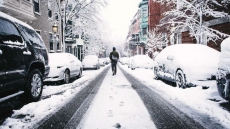OTTAWA - The only publicly acknowledged hero of the U.S. military operation that took down Abu Bakr al-Baghdadi has become an internet sensation after suffering injuries in the underground blast that killed the shadowy Islamic State leader.
And he or she isn't even an American soldier — at least not in the traditional sense. It's a military dog, just one of many used by U.S. forces for patrols, guard duty, intimidation and sniffing out threats.
U.S. President Donald Trump tweeted out a picture of a dog receiving a medal captioned "AMERICAN HERO!" and later referenced that the actual dog in the raid, named Conan, will be leaving the Middle East next week and heading to the White House.
Canada's special forces, too, have been quietly building up their canine units in recent years. They just they don't like to talk about it.
Canada, like many countries, has a long history of using dogs, horses and even carrier pigeons in war. That includes the use of sniffer dogs in Afghanistan to find improvised explosive devices, which were responsible for the majority of Canadian deaths during the decade-long mission.
As integral as those dogs were considered to the Canadian war effort in Afghanistan, they were owned and handled by contractors hired by the military specifically for the task — contracts that expired when the mission ended.
The military's experience with dogs wasn't over, however. In fact, it was just beginning, said Capt. Jamie Donovan of Canadian Special Forces Command.
"Canadian special forces gleaned much from allies in Afghanistan in the employment of canines in support of special-operations forces, and were themselves using canines on operations by the end of that mission," Donovan said in an email this week.
"Following Afghanistan and since 2012, we've aimed to further develop and sustain a canine capability within the command."
While he would not provide further information on the number of dogs or canine units in the ranks of Canada's special forces or where else they have been used, Donovan did reveal they are divided into two groups.
One group is trained exclusively for sniffing out threats such as bombs while the other is also used to conduct patrols with Canadian special forces soldiers and track and apprehend enemy fighters.
The military would not provide further details about its canine units, but some clues can be found in a public notice published last year in which the Department of National Defence revealed it was looking to buy a number of dogs.
"DND has a requirement for canines that demonstrate the characteristics and capabilities to successfully complete a demanding training program followed by working in a challenging operational environment," reads the notice, published in December 2018.
In particular, the Forces were in search of untrained Belgian malinois, German shepherds and Dutch shepherds between the ages of 10 months and three years.
At the same time, the selected dogs needed to show a "sound temperament and a bold and confident attitude with no signs of either shyness or over-aggression," the ability to work with people and learn, a strong drive to hunt and retrieve and an "implicit ability" to fight if required.
They were also forbidden from showing any fear of water, any propensity to bite their handler during stressful moments, and needed to "show no fear and not be distracted by unsure footing, tight and/or dark enclosed spaces, moving vehicles and loud noises including gunfire."
Lest any dog lovers out there worry the Canadian military has been secretly sending dogs into battle without the proper equipment, public records show the government has bought tens of thousands of dollars worth of protective vests for its canine units over the past few years.
The government has also quietly spent around $500,000 on more than a dozen custom-fitted vests for the military's canine units that include video cameras and receivers that let handlers see and hear what their dogs are experiencing in the field.

